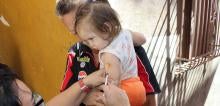Milestones on the road to health equity at the Pan American Health Organization
Equity has become a key objective for the Pan American Health Organization (PAHO). This is the result of multidimensional movements with a history that can only be understood in the light of social relations that structure the processes we refer to as "health". From an initial concern for maritime trade to a current interest in the social determinants of health, PAHO has strengthened its efforts to make the concept of health equity the ultimate goal of its actions.














